
A group of residents in St. Gabriel, a suburb of Baton Rouge, Louisiana, is no stranger to industrial pollution. The small town is on the banks of the Mississippi River in a stretch of land between New Orleans and Baton Rouge containing more than 100 petrochemical factories. To the industry, it’s known as the “Petrochemical Corridor,” but to everyone else it’s “Cancer Alley.” This fact is fueling a local drive to stop any new industrial plans that would add to the area’s already heavy pollution burden.
The Louisiana Environmental Action Network (LEAN) has been assisting the Citizens for a Better St. Gabriel, a citizens group formed with the goal of halting one such company from expanding operations in their neighborhood.
The company, Adsorbent Solutions, has run an industrial recycling facility in St. Gabriel since 2008, and is already on the hook for a $30,000 fine from state regulators for non-compliance, which includes polluting a local waterway and violating Clean Air Act permits repeatedly in recent years.
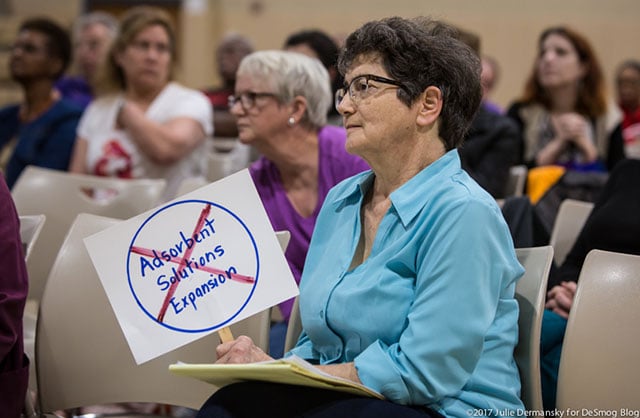 Lydia Haydel at a DEQ permit hearing in St. Gabriel on March 7. (Photo: Julie Dermansky)
Lydia Haydel at a DEQ permit hearing in St. Gabriel on March 7. (Photo: Julie Dermansky)
Adsorbent Solutions has requested the necessary permits for its expansion from the Louisiana Department of Environmental Quality (DEQ) and St. Gabriel’s City Council. DEQhas granted the company the air modification permit it needs, but the city council denied the request to rezone and expand its size.
But with the company’s state permit in hand, residents fear it will challenge the city’s authority to stop the expansion. Representatives from Adsorbent Solutions said it isn’t going anywhere, likely ruling out some residents’ hope the company would leave the area entirely.
LEAN is not waiting for Adsorbent Solution’s next move. The environmental group took legal action against DEQ by filing a petition in the 19th District Court, asking a judge to review the state’s decision to grant an air permit modification.
LEAN argues DEQ didn’t meet its obligations under the state constitution to protect the public and the environment. Its petition says the DEQ’s decision creates “unacceptable risks” to people living near the plant. Furthermore, the petition states:
“Of particular concern is its repeated failure to burn the industrial hazardous pollutants it is supposed to clean at the minimum temperature required by its permit and failing to use the required pollution control devices.”
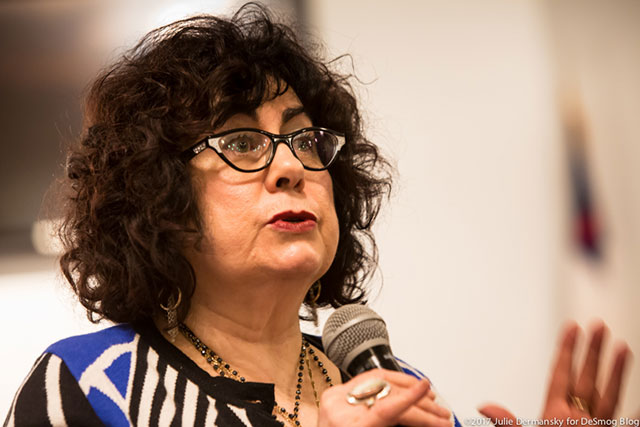 Marylee Orr, executive director of LEAN, at a community meeting in St. Gabriel on February 24. (Photo: Julie Dermansky)
Marylee Orr, executive director of LEAN, at a community meeting in St. Gabriel on February 24. (Photo: Julie Dermansky)
Marylee Orr, executive director of LEAN, is disappointed in many of DEQ’s recent actions. This is her first time in nearly 30 years of dealing with the regulatory agency that it has failed to send a written response dealing with concerns raised at the hearing to those who testified against a permit application, something which she says DEQ is required to do.
I asked DEQ if it had sent a response to anyone who testified against the permit at the hearing but didn’t get an answer. DEQ spokesperson Greg Langley said via email he wouldn’t be able comment on any questions about a legal action.
Fenceline Community in St. Gabriel
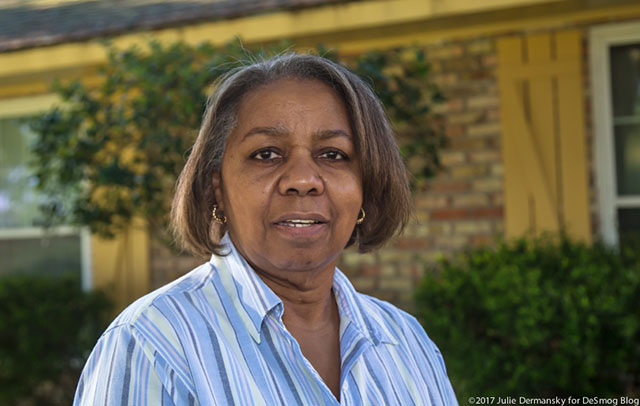 Brenda York in front of her home in St. Gabriel, Louisiana. (Photo: Julie Dermansky)
Brenda York in front of her home in St. Gabriel, Louisiana. (Photo: Julie Dermansky)
“My house no longer feels like my castle because every day I worry about the quality of the air,” Brenda York told me when I visited her in St. Gabriel. York is part of the Citizens for a Better St. Gabriel.
 Eugene Willis in front of his home in St. Gabriel, less than a quarter mile from Adsorbent Solutions. (Photo: Julie Dermansky)
Eugene Willis in front of his home in St. Gabriel, less than a quarter mile from Adsorbent Solutions. (Photo: Julie Dermansky)
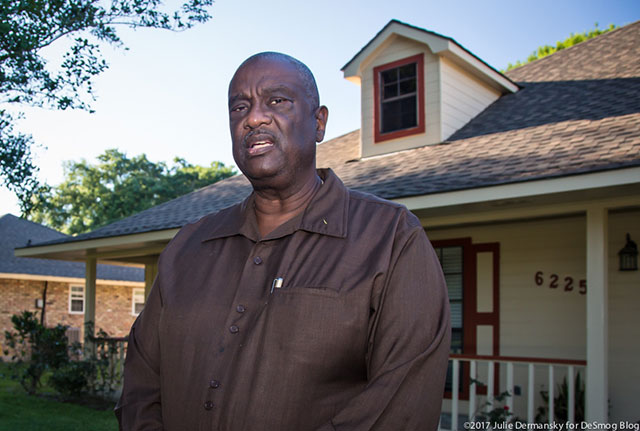 Reginald Grace at his home in St. Gabriel, a couple of blocks from Eugene Willis’ home. (Photo: Julie Dermansky)
Reginald Grace at his home in St. Gabriel, a couple of blocks from Eugene Willis’ home. (Photo: Julie Dermansky)
“Everyone in our community either has cancer or knows someone close to them who has cancer, or has died of cancer,” Eugene Willis told me, echoing a common refrain from others living in Cancer Alley. He and Reginald Grace, both members of the citizens group, took me on a tour of the industrial facilities in the area.
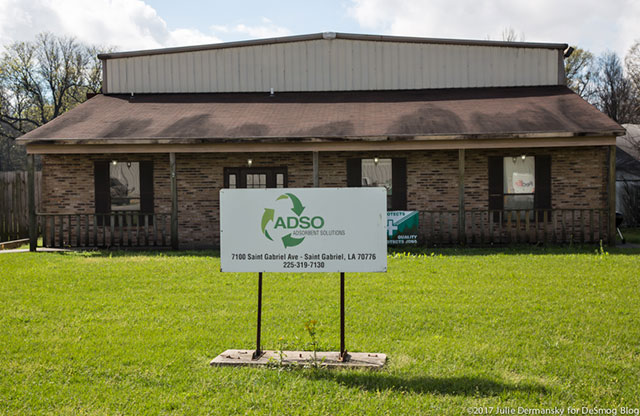 Adsorbent Solutions facility in St. Gabriel. (Photo: Julie Dermansky)
Adsorbent Solutions facility in St. Gabriel. (Photo: Julie Dermansky)
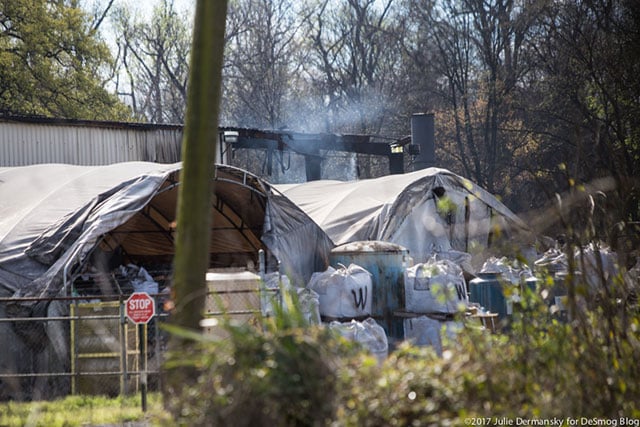 Smoke rising from Adsorbent Solutions facility in St. Gabriel on February 24. (Photo: Julie Dermansky)
Smoke rising from Adsorbent Solutions facility in St. Gabriel on February 24. (Photo: Julie Dermansky)
I got a whiff of the odor they often confront when we stopped in front of the Adsorbent Solutions facility. Smoke was rising from the outdoor operations. Jesse Brooks, who works at the facility, came over to see what we were doing. We asked him what kind of chemicals were burning. “We aren’t burning anything hazardous here,” Brooks insisted.
I asked what was causing the odor, and he said he would go back and “check what the problem is.” I never got my answer. When I asked Brooks the same question at a St. Gabriel City Council meeting weeks later, he refused to answer after establishing that I was a member of the press.
Many in the community are convinced that Adsorbent Solutions is the source of the foul smell that has plagued their neighborhood for years. “It isn’t hard to figure out the source of a rotten smell,” said Willis, who often drives to the facility to confirm the odor’s source before calling DEQ to make a complaint.
After we drove away from Adsorbent Solutions, Willis again called DEQ to report the foul odor. Almost a week later, the agency’s response consisted of asking whether he still smelled the emissions. “A ridiculous question to ask nearly a week later,” Willis said. The odors come and go, depending on the plant’s activities and wind direction, he said.
 Wilma Subra, technical advisor for LEAN, testifying at DEQ’s permit hearing on March 7 in St. Gabriel. (Photo: Julie Dermansky)
Wilma Subra, technical advisor for LEAN, testifying at DEQ’s permit hearing on March 7 in St. Gabriel. (Photo: Julie Dermansky)
Community members worry that their health-related problems are a result of emissions from Adsorbent Solutions. Wilma Subra, technical advisor for LEAN, told me that the community has good reason to be concerned. The health impacts they describe, from shortness of breath to various forms of cancer, match those associated with the chemicals the facility deals with. Some of the compounds involved are known “cancer causing agents” including benzene and formaldehyde.
Who Does the Louisiana Department of Environmental Quality Represent?
At a recent legislative session, Chuck Carr Brown, the DEQ secretary appointed by Governor John Bell Edwards, spoke out against a bill which would require companies found non-complaint three times to install fenceline air monitors. Brown explained that DEQ already had the authority to require companies to do just that.
The bill, HB 394, was voted down, a move that left some residents in St. Gabriel disappointed. At DEQ’s permit hearing in March, St. Gabriel community members requested air monitoring along the Adsorbent Solutions fence line, citing the company’s past record of non-compliance and recent odor issues. However, they fear the request fell on deaf ears.
When Brown took over DEQ in 2016, he told reporters he thought it was important to listen to the voices of those who live in fenceline communities. Though Brown has met with members of LEAN and the GreenARMY, a coalition of Louisiana environmental groups, many in the communities LEAN is working with don’t feel DEQ is listening to their concerns at all.
Brown told Orr he was willing to meet with the Concerned Citizens for a Better St. Gabriel after DEQ gave Adsorbent Solutions the permit, but Reginald Grace, one of the group’s leaders, told Orr he was not interested in meeting with Brown at this time.He said the group would have been happy to meet before the decision was made, but after, Grace saw no point.
Brown previously referred to another Cancer Alley citizens group LEAN works with, the Concerned Citizens of St. John the Baptist, as fear mongers. That group continues to voice its concerns that DEQ is not doing enough to protect their community, despite the Environmental Protection Agency warning that parts of the area have the nation’s highest risk of air pollution-caused cancer.
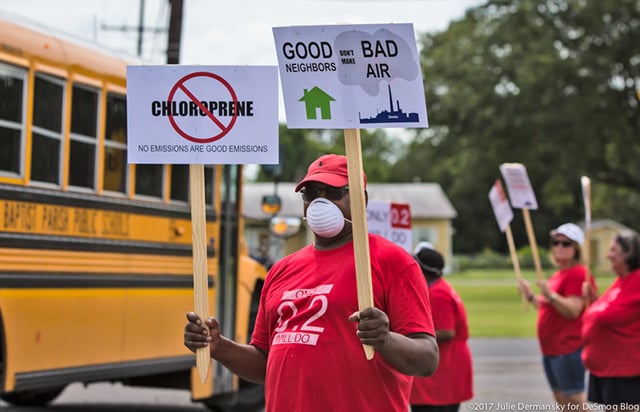 Members of the Concerned Citizens of St. John the Baptist near a school in Reserve, Louisiana, taking part in a public awareness campaign. (Photo: Julie Dermansky)
Members of the Concerned Citizens of St. John the Baptist near a school in Reserve, Louisiana, taking part in a public awareness campaign. (Photo: Julie Dermansky)
The group in St. John the Baptist recently initiated a public awareness campaign about its plight. Members are taking to the streets in front of schools, holding up signs with warnings about the pollutants in the air and handing out fact sheets.
Adsorbent Solutions President Goes Off-Script at Council Meeting
At a St. Gabriel City Council meeting on April 20, the day after DEQ approved Adsorbent Solutions’ permit, lawyers for the company made their case for the expansion plan, claiming it would benefit the community because of the company’s plans to employ state-of-the-art pollution prevention devices. They beseeched the city council to follow DEQ’s lead, referring to the state’s consideration of the matter as sufficiently rigorous for the city as well.
However, as Subra pointed out on behalf of LEAN, DEQ’s new permit allows Adsorbent Solutions to increase the amount of toxic air pollutants the facility releases annually by a factor of nearly two and a half, from 2.90 tons to 7.22 tons per year.
Absorbent Solutions president Stewart Fulton publicly pleaded his company’s case at the council meeting. He blamed other facilities in the area for the air pollution. His company’s non-compliance problems had been resolved with DEQ and now things are all about moving forward, he said. Fulton asserted that he is a Christian and that “God wants me to do this for the community.”
Gasps could be heard at the meeting when he invoked God, and a couple people snickered. But his religious reference didn’t sway the council members, who unanimously rejected the zoning request.
The work of Citizens for a Better St. Gabriel is only beginning. On May 22, word spread about another company asking to rezone in order to build an industrial facility in the neighborhood. Though the company’s plans aren’t yet clear, the community group is readying itself for a new battle, taking to heart the rallying cry of retired Lt. General Russel Honoré, founder of the GreenARMY: “The only one who will save us is us.”
All photos and video by Julie Dermansky.
Our most important fundraising appeal of the year
December is the most critical time of year for Truthout, because our nonprofit news is funded almost entirely by individual donations from readers like you. So before you navigate away, we ask that you take just a second to support Truthout with a tax-deductible donation.
This year is a little different. We are up against a far-reaching, wide-scale attack on press freedom coming from the Trump administration. 2025 was a year of frightening censorship, news industry corporate consolidation, and worsening financial conditions for progressive nonprofits across the board.
We can only resist Trump’s agenda by cultivating a strong base of support. The right-wing mediasphere is funded comfortably by billionaire owners and venture capitalist philanthropists. At Truthout, we have you.
We’ve set an ambitious target for our year-end campaign — a goal of $250,000 to keep up our fight against authoritarianism in 2026. Please take a meaningful action in this fight: make a one-time or monthly donation to Truthout before December 31. If you have the means, please dig deep.